Plot
Matthew Putnam is summoned back to his small hometown of Rockridge by his aged, bedridden aunt Nettie after seven years of enjoying himself in Europe, where he had been sent to study. She is tired and wants him to take charge of Putnam Dairies, the family business and the town's major employer. Every mother with a marriageable daughter is excited by the return of the wealthy young man, including Mathilda Sherman. However, Matthew shows no interest in Mathilda's daughter Irene.
When Matthew visits his good friend Will Oliver, he is pleasantly surprised to see how grown up and beautiful Will's daughter Marge has become. His reluctance to remain in town evaporates as he spends more and more time with her –flirting with her at the bank where she works.
This does not sit well with Roy Daniels. When Roy makes his bid for her affections, she turns him down, so he decides to leave for New York City the next day. Marge is up late at night trying to balance the church's finances, for which she and Roy are responsible. Finally, an irate Will calls over the shared telephone line (a "party line") and leaves an angry message for Roy to come over to straighten out the mess before he leaves town. However, telephone eavesdroppers misinterpret the message and assume that Roy has gotten Marge pregnant and is trying to leave town without marrying her.
Mathilda is delighted at the ostensible scandal and bullies her husband Tom, the president of the Sherman Bank, into firing Marge. She also disqualifies Marge's winning entry in the prestigious annual flower show. Marge and Matthew are oblivious to the rumors. He asks her to marry him; she accepts, provided they elope the next day. When Matthew is late for their elopement, Marge assumes he believes the stories. Will, having discovered it was his call that started the whole mess, shoots himself, but botches his suicide and survives with only a minor head wound.
Marge and Mathew separately find out about the ugly stories being circulated about Marge. Matthew decides to teach the town a sharp lesson. He first transfers all his money out of the Sherman Bank, which would lead to its collapse, and orders the replacement of all 300 local workers with out-of-towners. Faced with the destruction of their community, the workers organize a meeting that Matthew attends in the new town hall. Before things get totally out of hand, Matthew's aunt Nettie –who hadn't left bed the last fifteen years –shows up and gives the townsfolk a tongue-lashing for their malicious gossip by bringing up their own past misdeeds.
Everything is eventually straightened out and the couple sneak off to the nearby town Springfield to get married. However, the chastened townspeople have not changed their ways. A mock disagreement between the newlyweds about where they should spend their honeymoon is seen and misreported as a full-blown argument by Bert West.
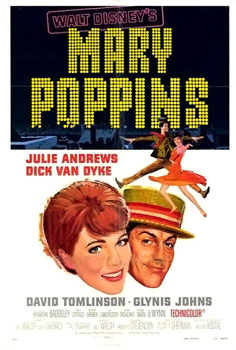
Mary Poppins is a 1964 American musical fantasy comedy film directed by Robert Stevenson and produced by Walt Disney, with songs written and composed by the Sherman Brothers. The screenplay is by Bill Walsh and Don DaGradi, based on P. L. Travers's book series Mary Poppins. The film, which combines live-action and animation, stars Julie Andrews in her feature film debut as Mary Poppins, who visits a dysfunctional family in London and employs her unique brand of lifestyle to improve the family's dynamic. Dick Van Dyke, David Tomlinson, and Glynis Johns are featured in supporting roles. The film was shot entirely at the Walt Disney Studios in Burbank, California, using painted London background scenes.
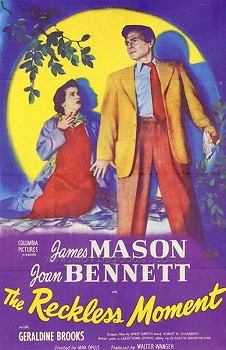
The Reckless Moment is a 1949 American film noir melodrama directed by Max Ophüls, produced by Walter Wanger, and released by Columbia Pictures with Burnett Guffey as cinematographer. It starred James Mason and Joan Bennett. The film is based on The Blank Wall (1947), a novel written by Elisabeth Sanxay Holding. The 2001 film The Deep End is a remake based on the same source material.
"The War of the Simpsons" is the twentieth episode of the second season of the American animated television series The Simpsons. It originally aired on Fox in the United States on May 2, 1991. In the episode, Homer gets drunk at a dinner party and embarrasses Marge, so she enrolls them in marriage counseling at a lakeside retreat with Reverend Lovejoy.
"Secrets of a Successful Marriage" is the twenty-second and final episode of the fifth season of the American animated television series The Simpsons. It originally aired on the Fox network in the United States on May 19, 1994. In the episode, Homer fears he may be a little slow, so he goes to the adult education center. While there, he decides to teach a class of his own on the secrets of a successful marriage, since that is the only class he is qualified to teach. However, to keep his students interested, he is forced to tell personal secrets about his wife Marge, which she dislikes, leading up to Homer getting kicked out of the house.
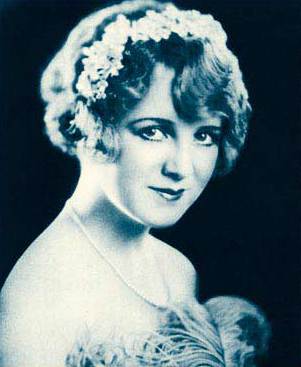
Marie Pauline Garon was a Canadian silent film, feature film, and stage actress.

Gypsy is a 1962 American musical film produced and directed by Mervyn LeRoy. The screenplay by Leonard Spigelgass is based on the book of the 1959 stage musical Gypsy: A Musical Fable by Arthur Laurents, which was adapted from the 1957 autobiography Gypsy: A Memoir by Gypsy Rose Lee. Stephen Sondheim wrote the lyrics for songs composed by Jule Styne. The film was remade for television in 1993.
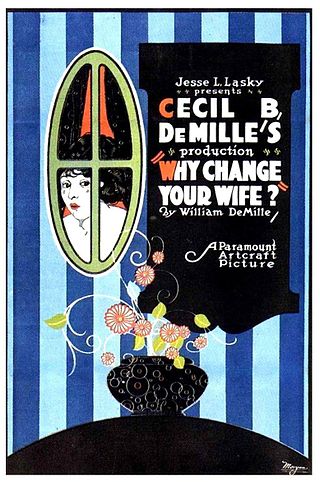
Why Change Your Wife? is a 1920 American silent comedy film directed by Cecil B. DeMille and starring Gloria Swanson.

Gertrude Dolores Messinger was an American film actress known for her B-movie roles from the 1930s through the 1950s. She began as a child actor in silent films, but found her greatest fame in talkies of the 1930s. During her career she appeared in more than 50 motion pictures, with particular success in westerns.

Number, Please? is a 1920 American short comedy film directed by Hal Roach and Fred C. Newmeyer featuring Harold Lloyd.

Among Those Present is a 1921 American "three-reeler" silent comedy film directed by Fred C. Newmeyer and starring Harold Lloyd, Mildred Davis and Mary Pickford.
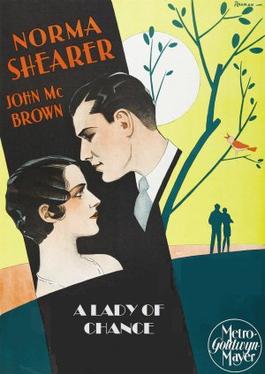
A Lady of Chance is a 1928 synchronized sound film directed by Robert Z. Leonard. While the film has no audible dialog, it was released with a synchronized musical score with singing and sound effects using both the sound-on-disc and sound-on-film process. The film is based upon the story "Little Angel" by Leroy Scott and is Norma Shearer's last silent film. Although the film was released with added dialogue scenes, Shearer had no lines. The film's copyright was renewed, so it did not enter the public domain until January 1, 2024.

Java Head is a 1934 British historical drama film directed by J. Walter Ruben and an uncredited Thorold Dickinson. It stars Anna May Wong, Elizabeth Allan and Ralph Richardson.

The White Desert is a 1925 American silent drama film directed by Reginald Barker. The film stars Claire Windsor and Pat O'Malley, with Robert Frazer, Frank Currier, and Sōjin Kamiyama. It is written by Monte M. Katterjohn and Gordon Rigby and adopted from Denver author Courtney Ryley Cooper's novel The White Desert (1922). This B movie was produced to keep the Loew circuit and other cinemas supplied. The title refers to the snow covered Colorado landscape during winter.

The One and Only is a 1978 comedy film starring Henry Winkler, directed by Carl Reiner and written by Steve Gordon.

Lady Windermere's Fan is a 1925 American silent drama film directed by Ernst Lubitsch. It is based on Oscar Wilde's 1892 play Lady Windermere's Fan which was first played in America by Julia Arthur as Lady Windermere and Maurice Barrymore as Lord Darlington. The film is being preserved by several archives. It was transferred onto 16mm film by Associated Artists Productions in the 1950s and shown on television. In 2002, Lady Windermere's Fan was selected for preservation in the United States National Film Registry by the Library of Congress, being deemed "culturally, historically, or aesthetically significant."
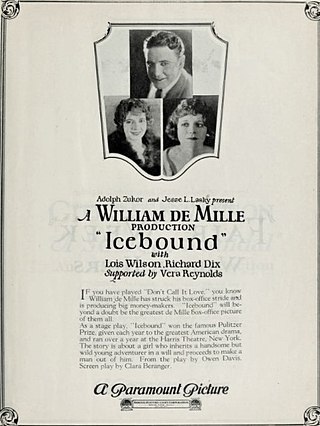
Icebound is a 1924 American silent drama film directed by William C. deMille, produced and distributed by Paramount Pictures, and based on a 1923 Pulitzer Prize Broadway produced play of the same name by Owen Davis. This film production was made at Paramount's Astoria Studios in New York City. Actress Edna May Oliver returned to the role that she played in the Broadway version.
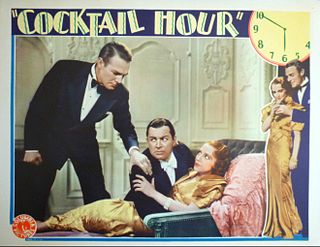
Cocktail Hour is a 1933 American pre-Code romantic drama film produced and distributed by Columbia Pictures and starring Bebe Daniels. This film was directed by Victor Schertzinger.

Oh, Lady, Lady is a lost 1920 American silent comedy romance film directed by Major Maurice Campbell and starring Bebe Daniels. It is based on a popular 1918 Broadway stage musical, Oh, Lady! Lady!!
Ruth Warren was an American film and television actress.
















